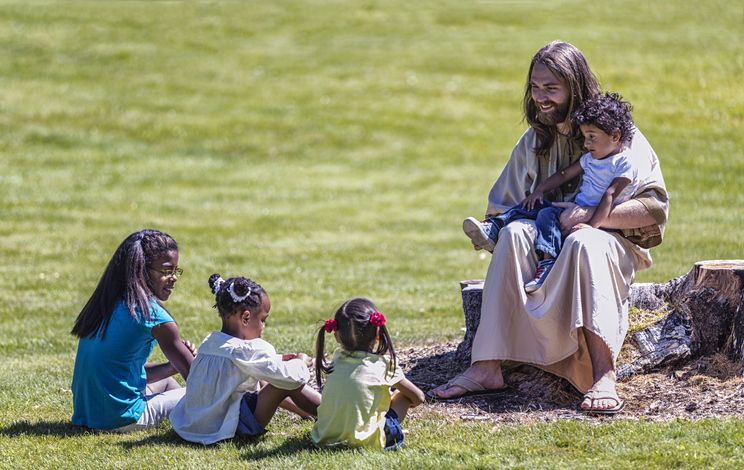Sabbath School Lesson for October 24-30, 2020
Don’t miss my YouTube channel for daily highlights of the lesson! http://bit.ly/teresathompson
Overview
Why we look to Jesus as the Master Teacher will be examined with these aspects in mind:
- Why and how Jesus was sent to reveal the Father to us (Sunday and Monday)
- How we are to read and have the mind of our teacher Jesus (Tuesday)
- What part reconciliation plays in our teaching (Wednesday)
- What those first pupils of Jesus did with their knowledge of Him (Thursday)
Introduction
Christ has been described as the Light of the World, and we are told to be lights as well. Students often do become like their teachers, so understanding Jesus and His mission is vital to being the kind of teachers and lights God wants us to be.
Jesus, the Word, spoke our world into existence, we are told in John 1:1-4. And light was created on the first day of Creation week. In order for us to see what we’re doing, we need light. It may have even been helpful, or at least enjoyable, for God to see the beautiful work He had planned for this planet in the days that followed.
Memory Verse: “For it is the God who commanded light to shine out of darkness, who has shone in our hearts to give the light of the knowledge of the glory of God in the face of Jesus Christ.” 2 Corinthians 4:6 NKJV
In the end, Jesus’ mission was to reveal His Father. We have actually seen God most intimately, through His Son. Like Him, we are to reflect the Father’s glory, spreading to the world the knowledge of God and His plan to save us.
The more we know about Jesus, the better we can reflect Him to those around us. The disciples, who worked most closely with the Master Teacher, didn’t fully understand His message during those years of public ministry. So, we must never stop trying to understand His mission and our role in fulfilling it.
Sunday: Revealing the Father
Two very fine passages in the Bible provide introductions to Jesus, allowing us to know many of His worthy features, including the purpose of His coming to this earth. They are found in Hebrews 1:1-4 and 2 Corinthians 4:1-6.
The writer of Hebrews wants us to know that God used His Son to create and sustain everything in the universe. In addition, He spoke to us through the prophets and has now inherited a heavenly position which is above the angels–at the right hand of God. He is the exact image of God, the Holy One worthy of our worship and praise.
Paul, in writing to the Corinthians, also used the imagery of Creation to remind us that it was “God who commanded light to shine out of darkness” (2 Corinthians 4:6). He has used this light, in the person of Christ, to provide us with the knowledge of who the Father is. He also referred to Him as the image of God, showing us the Father’s glory.
Bible Verses to Consider:
Hebrews 1:1-4
- What notable points were mentioned here about the role of God’s Son before He came to earth in human form?
- How does Jesus help us right now, while we still struggle with sin?
- How will we see our Savior when we get to heaven?
2 Corinthians 4:1-6
- Why is it important to recognize that Jesus is Lord (v. 5)?
- Why is it important to understand Jesus’ role in Creation (v. 6)?
Monday: Revealing the Father (cont.)
Of all the Gospels, the book of John highlights most the divinity of Jesus. John begins his story by strongly affirming Jesus’ role in Creation. He brought light to our planet on the first day of Creation week. Later, He became a Light that shines brightly in a sin-darkened world (John 1:1-18).
Seven “I AM”, or Yahweh, statements appear in John’s Gospel. I AM the bread of life (John 6:35), the light of the world (John 8:12), the door (John 10:9), the good shepherd (John 10:11), the resurrection and the life (John 11:25), the way, the truth, and the life (John 11:25), and the true vine (John 15:5).
John 1:14 clearly states that through Jesus we see the glory, grace, and truth of the Father. And yet, His disciple, Philip, asked Him to show them the Father (John 14:8). His request revealed that the disciples were struggling, even far into their three-year ministry, to know who He was, in relation to the God of heaven.
Philip’s honest desire to see the Father, even though He was right there in front of him, should make us aware that perhaps we don’t know God and Jesus nearly as well as we think we do.
Bible Verses to Consider:
John 1:1-5
- How do these verses show two kinds of light that Jesus provides? What are they?
- Why does the world fail to comprehend the light that Jesus brings?
John 14:7-11 and Hebrews 11:3
- Why weren’t the disciples able to see who Jesus really was?
- Why are faith and belief so important in getting to know Jesus?
Tuesday: Reading the Master Teacher’s Mind
Philippians 2:5-11, is thought to be one of the most profound passages in the Bible. The reason for that is no doubt the way it reveals the depths of humility and obedience that Jesus showed us when He came to this earth. And verse 5 tells us to let Jesus’ mind be in ours.
Paul had reason for his concern for the church in Philippi. He pointed out earlier in the chapter that nothing should “be done through selfish ambition or conceit”. Their unity depended on looking out for the interests of each other, not their own interests.
Submitting to God, having lowliness of mind (or humility), is necessary before true obedience will ever be achieved in God’s church.
Christ is our best example for the kind of humility and obedience we need to have in order to have the mind of Jesus. His life of service was full of unselfish, compassionate deeds of mercy. Others’ needs always came before His own.
Bible Verses to Consider:
Philippians 2:1-4
- What were some of the things Paul pointed out to the church in Philippi?
- How would paying attention to his observations lead to greater unity for the church?
Philippians 2:5-11
- In what ways was Jesus a good example for them to follow?
- How can Jesus’ mind be in ours?
Wednesday: The Master Teacher and Reconciliation
We’ve almost all experienced the end of a relationship at some time in our lives. The breaking of bonds that held us together is often painfully real to most of us. How sweet it is when these bonds are mended–when people come back into a healthy, friendly relationship with each other. This is what reconciliation is all about.
It can be difficult to be the one who makes the first effort to repair a relationship, so God has taken that responsibility off our shoulders when it comes to being reconciled with Him. The promise of a Seed that would battle the power behind the serpent there in the Garden of Eden was an invitation to return to God.
God has continuously extended this invitation to His children here on earth, culminating in the birth and death of His only Son Jesus. No greater expression of reconciling love could come to sinners, who have done nothing to deserve such a sacrifice from the heart of God.
We are encouraged to participate in this work of reconciliation by reflecting the spirit of Christ in all our dealings with others. This hopefully results in joyful unity and peace with each other and with God. Everyone comes out the winner when reconciliation is the goal.
Bible Verses to Consider:
2 Corinthians 5:17
- What does it feel like to be reconciled to God?
2 Corinthians 5:18, 19 and John 17:18
- Why does God ask for our help when it comes to reconciliation?
- What prompts us to try to reconcile others with God?
Colossians 1:15-17
- Why is Christ so often mentioned for His role in Creation?
- How is that knowledge helpful in reconciling the world to God?
Colossians 1:18, 20
- Why is it important to know about Christ as our Redeemer, as we help in this work of reconciliation?
Thursday: The Master Teacher’s First Pupils
There’s much we can learn from the first students of Christ, those who were privileged to see and worship Him when He was still a Babe in Bethlehem. What kind of lessons might be learned from these first pupils of His– Mary, Joseph, and the shepherds and wise men?
Only the second chapter of Luke’s Gospel has the rich details about the Savior’s birth that has made it our favorite in telling the story. But Matthew also relates the story of the wise men’s visit, shortly after His birth. All these actors in the narrative must have had treasured memories of their contact with the Messiah when He first took on humanity and began the journey that ended in His horrible death by crucifixion.
- First of all, we have to admit that knowing the Scriptures, especially the prophecies about the Messiah, enabled them to recognize the Babe for who He was. We, too, must become as familiar with the Scriptures as we can, if we are going to be able to worship Him properly when He comes again to this earth, as He’s promised.
- Next, we notice the searching and longing that must have taken place for these people to be able to experience the things they did. They had all been praying for the Messiah to come, even before they knew about their role in the story.
- And finally, we can profit from the kind of reverent worship that occurred during these visits. These first pupils were all left in awe at the sight of this longed-for Child that was at that time so tiny and helpless before them. He was our loving, humble Redeemer, who came all the way from heaven to reveal the Father’s love for an undeserving world of sinners.
Bible Verses to Consider:
Luke 2:20 and Matthew 2:10, 11
- How did these first witnesses of Christ’s birth express their adoration of Him?
- What lessons can we learn from their worship?
Luke 2:19
- What might Mary have “pondered” in her heart, and why would these memories mean so much to her in the future?
Friday: Conclusion
What a high standard for all Christian teachers. They must uphold the character of God and, through humility and obedience, do the important work of reconciliation. This means that through their efforts they can bridge the gap between their students and the God of heaven.
Parents and all those who wish to witness to their family, neighbors, and friends must keep this reconciliation in mind as well. Only by having the mind of Jesus, our Bibles tell us, can we accomplish such a worthy goal.
Our constant focus should center on what Jesus did and who He was, what He’s doing now, and what He will do in the future for His children. The stakes are too high to neglect this part of our education. A lifetime is not enough to glean all we want to know, and what we need to know, about Jesus. But we must spend our lifetime trying.
Next Week: More Lessons From the Master Teacher
To read the Sabbath School Lesson Quarterly or see more resources for its study, go to









